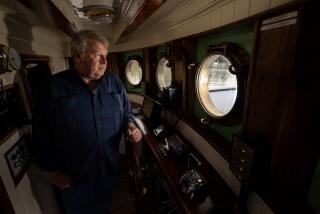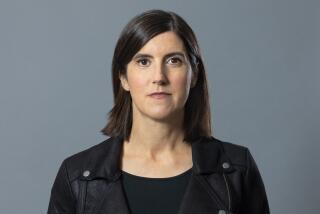A literary son gives voice to Central Coast
- Share via
Cracking open his new book, Thomas Steinbeck nervously clears his throat and apologizes in advance to the small audience for any sentences he might mangle. “The only person who was a worse reader than me was my father,” Steinbeck explains in his gravelly baritone, preparing to read his work in public for the first time.
The 58-year-old Oxnard resident then launches into a tale reminiscent of those told by his novelist father, a story drawn from the colorful characters who settled California’s Central Coast, a hand-spun yarn passed around the Steinbeck family dinner table like so many home-cooked meals.
Thomas Steinbeck was nurtured by such narratives, born into a family in which storytelling was king, and where the king of all storytellers was the man who would write “Of Mice and Men” and “The Grapes of Wrath” and go on to win the Pulitzer and Nobel prizes for his depictions of fall-down drunks and broken-down crop pickers.
But on this evening, people have gathered at a Santa Barbara bookstore to hear the words of the son, not the father. And while Steinbeck expects the comparisons to come, he assures his audience that he is not trying to emulate his father, nor ride the man’s coattails.
“Let me answer the question everyone asks: No, it wasn’t a problem growing up in my father’s shadow,” says Steinbeck, who was 24 when his father died. “There was no shadow. He was all light.”
Perhaps it is only fitting that in a year when Californians are celebrating the 100th anniversary of John Steinbeck’s birth with photo essays, book discussions and film screenings, a new Steinbeck voice should emerge.
After years of slugging it out as a Hollywood screenwriter with limited success, Thomas Steinbeck is now on a national book tour to promote “Down to a Soundless Sea,” a collection of short stories based on the stalwart souls who once populated the rugged Big Sur coastline. The seven stories take place near the turn of the last century, tracing the adventures of an eccentric cast of characters, from sailors and ranchers to doctors and immigrants.
The idea was born nearly a decade ago, on a day when Steinbeck was tossing back tequila and swapping stories with Michael Freed, developer of Big Sur’s Post Ranch Inn. Freed suggested that Steinbeck incorporate the stories into a book that could grace the rooms of the cliff-top resort.
Years later, as it neared completion, Steinbeck said his father’s agents caught wind of the project and asked to take a look. They shopped it to New York-based Ballantine Books, which promptly signed Steinbeck to a two-book deal. The initial run of 30,000 volumes hit bookstores earlier this month, riding a wave of critical praise.
Publishers Weekly said the family’s literary legacy was in good hands. Author Pat Conroy and playwright Terrence McNally applauded Steinbeck’s inherited love of a good story, suggesting that the collection would have made his father proud.
Hundreds of readers have packed book signings from San Francisco to Santa Barbara, including one event before an overflow crowd at the National Steinbeck Center in Salinas.
“I am as mystified as you are, believe me,” Steinbeck said of the response. “My writing most of my life has been dedicated toward making a living, and I haven’t had the luxury of saying, ‘Oh, I think I’ll write the great American novel.’ The fact is, somebody in my family has already pulled it off, and I’ve got no desire to compete with that.”
But he has earned praise in his own right. “Thom is a brave writer, and not just because of the legacy he’s tackling,” said Steinbeck’s editor, Dan Smetanka, an Orange County native who is pleased to see a return to stories chronicling California’s rich and colorful past. “He’s got the family name, and that’s kind of like the big opening presence in the room. But ultimately, the book will stand on its own.”
Shaped by his father
Born in New York but raised on both coasts, Thomas Steinbeck said his father taught him and his brother, John, much about writing. Shaped by the Depression, the elder Steinbeck thought it a blessing to have work of any kind, his son recalled. And he believed that writing was a craft, no more or less noble than the work practiced by mechanics or shoemakers.
He was not one to read his stories aloud to family and friends. But stories around the dinner table were a different matter, and the Steinbeck boys grew up surrounded by fanciful tales polished and practiced by aunts and uncles and, of course, their father, who reveled in stories that served as entertainment and oral history.
“My father was addicted to raconteurs and liars,” Steinbeck said. “And as children, we were always encouraged to have good stories to tell, and we were judged on how well we told them.”
Steinbeck honed those tales over the years, through his time at the Chouinard Art Institute in Los Angeles and UCLA’s film school, through the years he served in Vietnam.
Friends who have heard the stories are pleased that he decided to put them down on paper, despite reservations about comparisons to his father or the criticism he might receive from people convinced he was trying to benefit from the family name.
“I think it’s a difficult path, but I think Thom is up to it,” said Kim Greer, chief executive of the National Steinbeck Center, where Steinbeck serves on the board of trustees. “Although he shares some things with his dad, he is his own person and he has his own passions.”
Friend and entertainment attorney Phillip Rosen shares that view: “I would think it would be incredibly intimidating, but he doesn’t seem cowed by it. He’s a supremely talented guy, and I think he really is showing that his work can stand on its own.”
And so it does on a recent evening at Borders Books & Music Cafe in Santa Barbara, where Steinbeck has concluded his first public reading and is opening the floor to questions.
He is immediately drawn into a conversation about the family tradition of telling stories, but he lets the crowd know he never intended to put any of them on paper, much less assemble them into a book. For that, Steinbeck jokes, he has a long list of people to blame, including his wife, Gail, who serves as his front-line editor and all-around taskmaster.
In fact, it was her work that sealed the book deal in the first place. And it’s her fault that he’s being dragged into the spotlight from the relative anonymity of Oxnard, where the couple moved several years ago from West Los Angeles because Steinbeck was more comfortable around farm workers than movie executives.
“He’s been dragged into it, kicking and screaming,” Gail Knight Steinbeck said. “But this has really been wonderful for him. I think he is finally feeling like he has found his own voice and finally started to feel comfortable standing on his legs.”
Steinbeck better get used to the attention. He is scheduled for a book signing in New York today, then goes to Chicago before returning west. And he will soon start work on his second book, a historical novel focusing on early California immigration.
He can’t wait to get to it, especially since it means he will be able to escape the public stage.
“I never really thought of myself as a writer of books, so this is all a complete shock to me,” he said. “It’s not like I set out at 58 to be competition for John Steinbeck. I never thought of myself in his caliber, so there has never been that confusion for me. In fact, I’m one of his greatest fans.”
More to Read
Sign up for our Book Club newsletter
Get the latest news, events and more from the Los Angeles Times Book Club, and help us get L.A. reading and talking.
You may occasionally receive promotional content from the Los Angeles Times.








